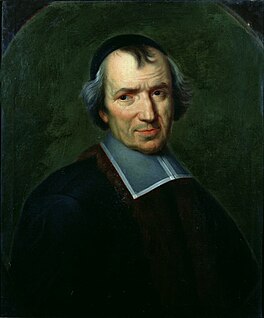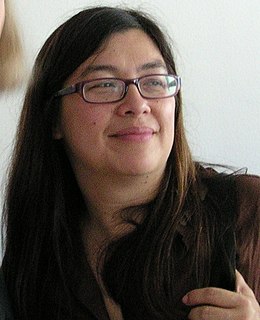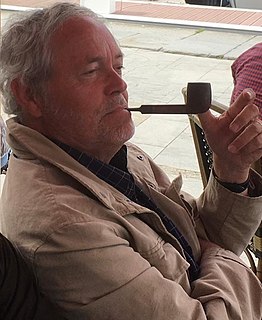
Denis Moreau (born 8 April 1967) is a French philosopher. [1]

Denis Moreau (born 8 April 1967) is a French philosopher. [1]
Born in Bordeaux, Moreau is a former student of the École normale supérieure de Paris (L1987) [2] and member of the Institut universitaire de France. He taught at the Paris 12 Val de Marne University, then at the University of Nantes where he is currently professor of history of modern philosophy and philosophy of religion. [3]
His work focuses on two main fields: on the one hand, the history of 17th century philosophy, in particular Descartes and cartesianism, and on the other hand, the philosophy of religion, in particular christianity. He intends to follow the tradition of "Christian rationalism", specifying that he considers it necessary to count among the great representatives of this current thinkers such as Augustine of Hippo, Thomas Aquinas, Descartes, Malebranche, Spinoza, and Pope Benedict XVI. [4] In his work on the philosophy of religion, he does not claim to propose a new understanding of Christianity, but tries to re-explain, with tools accessible to contemporary readers, central notions of Christianity that have become difficult to understand. He has devoted books to the theme of salvation (Les Voies du salut, [5] Mort où est ta victoire ?) another one to marriage (Pour la vie ? Court Traité du mariage et des séparations [6] )
A Rock'n roll fan, [7] he tried, especially in a novel, Dans l’ombre d’Adam [8] to bring together biblical texts and some currents of the Heavy Metal. He has defended, on several occasions, from his Catholic point of view, the French metal music festival "Hellfest" [9] [10]
He contributes to the journal La Vie. [11] [12] [13] [14] [15] He directs the series "textes cartésiens en langue française" [16] at editions Vrin and co-directs the series "Philosophica" at the Presses Universitaires de Rennes.

Antoine Arnauld was a French Catholic theologian, philosopher and mathematician. He was one of the leading intellectuals of the Jansenist group of Port-Royal and had a very thorough knowledge of patristics. Contemporaries called him le Grand to distinguish him from his father.

Étienne Émile Marie Boutroux was an eminent 19th-century French philosopher of science and religion, and an historian of philosophy. He was a firm opponent of materialism in science. He was a spiritual philosopher who defended the idea that religion and science are compatible at a time when the power of science was rising inexorably. His work is overshadowed in the English-speaking world by that of the more celebrated Henri Bergson. He was elected membership of the Academy of Moral and Political Sciences in 1898 and in 1912 to the Académie française.

Étienne Henri Gilson was a French philosopher and historian of philosophy. A scholar of medieval philosophy, he originally specialised in the thought of Descartes; he also philosophized in the tradition of Thomas Aquinas, although he did not consider himself a Neo-Thomist philosopher. In 1946 he attained the distinction of being elected an "Immortal" (member) of the Académie française. He was nominated for the Nobel Prize in Literature.
Léon Brunschvicg was a French Idealist philosopher. He co-founded the Revue de métaphysique et de morale with Xavier Leon and Élie Halévy in 1893.
Michel Henry was a French philosopher, phenomenologist and novelist. He wrote five novels and numerous philosophical works. He also lectured at universities in France, Belgium, the United States, and Japan.
Ferdinand Alquié was a French philosopher and member of the Académie des Sciences Morales et Politiques from 1978.

Pierre Hadot was a French philosopher and historian of philosophy specializing in ancient philosophy, particularly Neoplatonism.
Gilbert Hottois was a Belgian professor of philosophy at the Université Libre de Bruxelles who specialised in Bioethics.

Sandra Laugier is a French philosopher, working on moral philosophy, political philosophy, philosophy of language, gender studies, and popular culture. She is currently a full professor of philosophy at the University of Paris 1 Panthéon-Sorbonne and a Senior member of the Institut Universitaire de France, after being a professor at the University of Picardy Jules Verne in Amiens until 2010.
Martial Gueroult was a French philosopher. His primary areas of research were in 17th- and 18th-century philosophy as well as the history of philosophy.

Gwenaëlle Aubry is a French novelist and philosopher.

Xavier Tilliette was a French philosopher, historian of philosophy, and theologian. A former student of Jean Wahl and of Vladimir Jankélévitch, he was a member of the Society of Jesus (1938) and professor emeritus at the Catholic Institute of Paris (1969), having taught also at the Pontifical Gregorian University of Rome (1972), the Lateran University, and the Centre Sèvres in Paris.
Victor Goldschmidt was a French philosopher and historian of philosophy.
François Dagognet was a 20th-century French philosopher.
Françoise Dastur is a French philosopher. She is Professor Emeritus at University of Nice Sophia Antipolis. She is a specialist of the works of Martin Heidegger.
Roger Kempf was a French writer, philosopher, Germanist and ethnologist of literature, and emeritus professor at the École polytechnique fédérale de Zurich.
Michel Malherbe is a French translator and philosopher. A specialist of Anglo-Saxon empiricism, he has translated Bacon, Locke and Hume. He is director of the series "Analyse et philosophie" and "Bibliothèque des philosophies" by Vrin.
Pierre Cassou-Noguès is a French philosopher and writer.
Danielle Cohen-Levinas is a French philosopher, musicologist, and a specialist of Jewish philosophy.

Bruno Pinchard is a French writer and scholar, Doctor and Professor of philosophy.